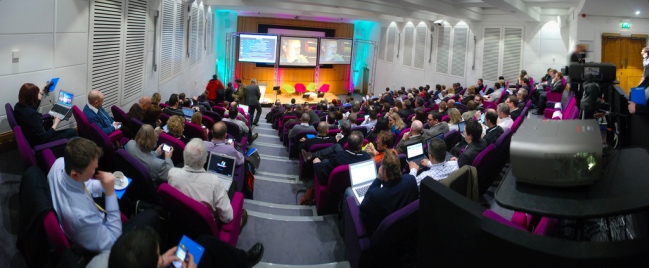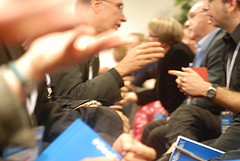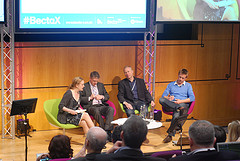Meeting with Ed.D. supervisor: conceptual ecologies, productive concepts, and hypozeugma
I met via Skype with my thesis supervisor, Steve Higgins, a couple of weeks ago to discuss the process of finishing off and submitting my thesis. It currently stands at around 34,000 words but, given that I wrote 17,500 words of a mobile review in little more than a week, it’s not the actual getting close to 60,000 words that’s the issue: it’s the overall coherence.
Skype’s persistent chat history is fantastic; I can remember reading recently of a company that’s committed to promoting Open Source products, but that uses Skype (which is proprietary and closed-source) internally because of exactly this feature. I use it to note down important points in the conversations Steve and I have (as well as recording the audio of the whole conversation) so I can go back to it later. Here, then, are my thoughts prompted by revisiting that Skype chat history:
Where’s the value(s)?
One of the many problems I have with the concept of digital literacy is that it’s an inherently value-laden proposition. It is, as Steve puts it, and ‘intentional concept’ in that people want to achieve things through its adoption and promotion: consensus, change, and the like. It’s like bandwagon-jumping rather than hitchhiking.
Problematising policy
In an attempt to make my thesis of practical value, I had intended to apply my findings to the policies in various countries. However, Steve and I are agreed that moving this section (with a slightly different focus) to near the beginning of the thesis makes more sense. I’m now going to analyse policies relating to ‘digital literacy’ in various countries, show how they are problematic, and then go on to my Pragmatic methodology.
Digital AND Literacy?
If we imagine a Venn diagram with ‘Digital’ in one overlapping circle and ‘Literacy’ in the other then it would appear obvious that ‘Digital Literacy’ is the intersection of these two. However, as has become clear in my research, the information literacy community seem to have taken over the ground that includes everything other than the intersect. This muddies the waters massively.
In order for ‘Digital Literacy’ (in terms of the intersect) to be of added value then there needs to be something particular about it that isn’t covered by ‘Digital OR Literacy’.
Hardness and methodological rules
Before our meeting, Steve sent me this from my former Philosophy lecturer at the University of Sheffield:
The pragmatist principle is defended as a methodological rule [author italics] and Peirce hopes to show, on the basis of a systematic theory of signs, that it is an adequate rule for its intended purpose. A pragmatist analysis of hardness, for example, would tell us what is involved in believing that something is hard. … Clarification of a concept using the pragmatist principle provides an account of just what commitments I incur when I believe or assert a proposition in which the concept is ascribed to something. (Hookway, C. (2002) Truth Rationality and Pragmatism, p.60)
If I’m using the Pragmatic method, therefore, I need to explain the ‘commitments incurred’ when expressing the concept of ‘digital literacy’.
The local and the global
Pragmatism is predicated upon the idea that truth is what a community of inquirers would settle upon after a long period of time. There are, as Steve points out, both ‘local’ and ‘global’ communities of inquirers which has an impact for the meaning of terms such as ‘digital literacy’. It is likely, therefore, that the conclusion of my thesis will reconsider the policy documents presented in the first half of the thesis, explaining that what is ‘good in the way of belief’ in one country/area (local) is not necessarily good or useful elsewhere (global).
Conceptual ecologies
Words and vocabularies change over time. It may be, therefore, that at one point in time ‘digital literacy’ is/was a functional metaphor that, through a ‘creative ambiguity’ provided a negotiable space for dialogue. Taking a ‘conceptual ecologies’ view allows for the consideration of ‘spaces not boundaries’ (to quote Steve) – engaging with the concept of digital literacy may change your view of the world, and in turn change your view of the concept.
Productive concepts
Just because an ambiguity or a concept creates a metaphorical space for discussion and debate doesn’t make it useful. Like the f-stop controlling the aperture of a camera lens, larger and smaller amounts of creative space can be created through the use of metaphor. The debates in these spaces, however, have to be useful and of value to be considered ‘productive’. Any two words could be mashed together to create such a space, but it is the resulting conversation that is important.
Zeugma
Steve introduced me to the term Zeugma during our conversation, but then wondered whether ‘digital literacy’ was, after all, an example. I think he may be on to something and, given further investigation, think ‘digital literacy’ may be a hypozeugma:
The hypozeugma, also called an adjunctio in Latin, is a zeugma where a verb falls at the end of a sentence and governs several parallel clauses that precede it.
On the other hand, ‘digital literacy’ may be a full-on Syllepsis:
Syllepsis, also known as semantic zeugma, is a particular type of zeugma in which the clauses disagree in either meaning or grammar. The governing word may change meaning with respect to the other words it modifies. This creates a semantic incongruity that is often humorous. Alternatively, a syllepsis may contain a governing word or phrase that does not agree grammatically with one or more of its distributed terms. This is an intentional construction in which rules of grammar are bent for stylistic effect.
Literacies of the digital
The idea of ‘literacies of the digital’ may be a better expression as it makes clear (as opposed to with ‘digital literacy’) that digital is the noun. Literacies of the digital could well be everything apart from the intersect of the two-circle Venn diagram mentioned above. Steve and I discussed whether ‘digital participation’ was the intersect, or whether such a concept was ‘read-only’. I would argue that there needs to be a critical element to this participative element of literacy.
I’ve certainly got some more thinking to do on this… :-p




